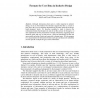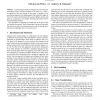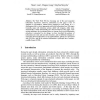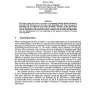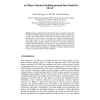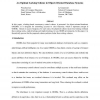HCI
2007
15 years 3 months ago
2007
Although information about users is vitally important in inclusive design, its use is often limited. The literature suggests that this is, at least in part, due to the ways in whic...
108
click to vote
ECAI
2008
Springer
15 years 4 months ago
2008
Springer
A rational agent adopts (or changes) its goals when new information (beliefs) becomes available or its desires (e.g., tasks it is supposed to carry out) change. In this paper we pr...
129
click to vote
DOCENG
2008
ACM
15 years 4 months ago
2008
ACM
Digital Libraries are complex information systems that involve rich sets of digital objects and their respective metadata, along with multiple organizational structures and servic...
95
Voted
APWEB
2008
Springer
15 years 4 months ago
2008
Springer
The Word Wide Web has becoming one of the most important information repositories. However, information in web pages is free of standards in presentation, without being organized i...
114
Voted
SIGLEX
1991
15 years 6 months ago
1991
This paper argues that there is no reason to distinguish between lexical information and real-world information on the basis of the formalisms used; that both types of knowledge c...
124
click to vote
INFOVIS
1995
IEEE
15 years 6 months ago
1995
IEEE
Visualizations which depict entire information spaces provide context for navigation and browsing tasks; however, the limited size of the display screen makes creating effective g...
WAIM
2000
Springer
15 years 6 months ago
2000
Springer
129
Voted
WAIM
2000
Springer
15 years 6 months ago
2000
Springer
Online Analytical Processing (OLAP) data is frequently organized in the form of multidimensional data cubes each of which is used to examine a set of data values, called measures, ...
132
click to vote
WAIM
2000
Springer
15 years 6 months ago
2000
Springer
In this paper, a locking-based concurrency control scheme is presented for object-oriented databases (OODBs). It is designed for controlling accesses to class hierarchy, which is ...
